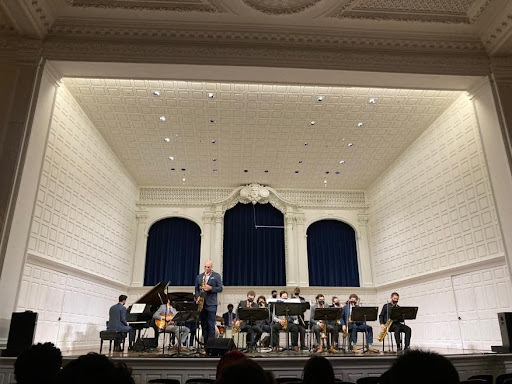Wayne Escoffery leads Yale Jazz Ensemble in performance celebrating Thelonious Monk and Duke Ellington
New Yale Jazz Ensemble Director Wayne Escoffery led the band in a concert on Wednesday, as band members expressed frustration with University policies for the performing arts.

Anne Gross
On Wednesday, the Yale Jazz Ensemble Big Band held a performance in Sprague Hall celebrating the music of Thelonious Monk and Duke Ellington.
The concert marked the directorial debut of Wayne Escoffery, a Grammy award-winning saxophonist and lecturer of jazz improvisation at the Yale School of Music.
“[Escoffery] is through and through a jazz musician. … He’s a real asset to jazz at Yale because he can show us things only someone who’s lived the music can,” said Ethan Dodd ’22, a lead tenor in YJE.
During the performance, Escoffery moved around on stage, frequently supporting his band with words of encouragement such as “nice,” or “mmm.” He guided the rhythm with his body through snaps, claps and elbow punches. The audience often followed his lead — during the third song of the set, Billy Strayhorn’s “Raincheck,” the crowd began clapping along to the music.
Before coming to Yale, Escoffery worked a frontline position in renowned jazz musician Tom Harrell’s quintet. Escoffery is also a founding member of the Black Art Jazz Collective, a collaborative group dedicated to celebrating the origins of jazz and Black icons with original compositions.
Throughout Wednesday’s performance, Escoffery’s saxophone glistened next to his music stand. During Ellington’s “Mount Harissa,” he took center stage with a solo that left the audience eager for more.
The setlist was personally meaningful for the musicians. During his opening remarks, Escoffery shared that it was “very dear” to him. He was first introduced to Ellington and Monk’s music when he was an undergraduate studying under American saxophonist Jackie McLean, he said.
While the performance largely went on without a hitch, band members noted their frustration with the University’s COVID-19 policies surrounding musical performances. According to Dodd, “COVID, or rather Yale’s COVID policy, really sucks the life out of live performance.”
“Who’d ever have thought we would be worried about keeping audience members away?” YJE Operations and Productions Manager Stephanie Hubbard said.
Attendance at Woolsey Hall on Wednesday was limited to 275 people, with only asymptomatic, vaccinated Yale community members allowed to attend.
Dodd expressed frustration with the limited audience, noting that most of YJE’s biggest fans come from New Haven but are not currently allowed to enter campus buildings.
As nearly all instruments in jazz bands consist of wind and brass instruments, most musicians were required to wear special masks with a slit in the center for the mouthpiece, which made performing “awkward and difficult,” according to Dodd. Additionally, many instruments had a bell cover attached in order to prevent aerosols from spreading.
When the musicians first came onstage and began to stick the mouthpieces of their instruments through their masks, scattered laughter emerged from the audience.

While others shared their discontent with University policy, Hubbard expressed her understanding of the need for strict policies.
“I understand why the students are frustrated, but I think the University is afraid of having to shut the place down again, and nobody wants that,” she said. “Given the fact that last year none of us could fathom the fact that they would even let the bands play again at all, the fact that they are letting us, to me, is almost surprising.”
Last year, YJE’s rehearsals and performances took place fully online. Since concerts could not be performed live due to health risks, musicians recorded themselves playing their individual parts and then later edited a video together.
“It felt pretty detached, honestly,” pianist Aidan Kluger ’24, who participated in this program, said. “Submitting parts individually — that’s not jazz. Jazz is about doing it in person, like this, and we’re happy to be back.”
Next year marks the 100th birthday of bassist and composer Charles Mingus. Ellington and Monk were two of Mingus’ greatest influences.







